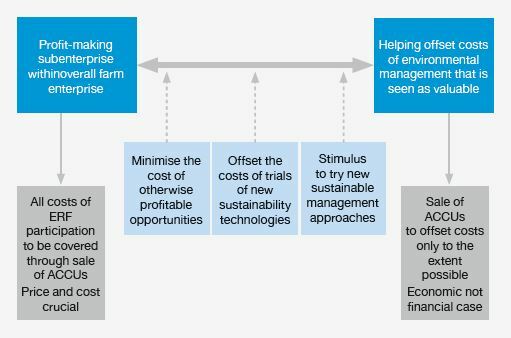An important part of considering a business case for carbon farming is to be very clear about why a carbon farming project may be of interest in your particular circumstances. The reasons for participation will influence how the business case is developed.
Indeed, it is a general principle that a business case can only be constructed relative to the objectives and business requirements of your particular farm enterprise. There is no general business case independent of specific business objectives.
The ERF creates many opportunities for farmers. The exact nature of the opportunities depends on the particulars of your farm operation. There is likely to be a spectrum of reasons for engaging with the ERF, none of which is right or wrong. Figure 1.1 illustrates the range of reasons for participation—from pure commercial gain to general environmental management.
The reasons for participating in the ERF will, in part, be influenced by the available approved methodologies.
At the same time, understanding the reasons for participation may also help in directing the development of new methodologies.
Figure 1.1: A spectrum of reasons for participating |
|
|
In many cases, farmers will be interested not only in the outside revenue that can come from carbon farming (through the sale of ACCUs that may be earned in the course of a project) but also in the general environmental management and environmental benefits that accrue. Such co-benefits will be of varying importance to different farmers, but they will be a key consideration in any business case.
Where co-benefits are a major consideration, the careful development of a business case remains important. While there may be non-financial (but still economic) reasons for participating in the ERF, such participation will be costly. It is important to be very clear about what those costs are, and the extent of costs that you are willing to accept in order to achieve the perceived benefits of carbon farming.
NOTE: In June 2021 the CER added a series of case study videos, available here, which provide a useful picture of differing business cases and are an excellent supplement to the remainder of advice in this Manual.
Explore the full Workshop Manual: The business case for carbon farming: improving your farm’s sustainability (January 2021)
Read the report
RESEARCH REPORTS
1. Introduction: background to the business case
This chapter lays out the basic background and groundwork of the manual
RESEARCH REPORTS
1.2 Being clear about the reasons for participating
Introduction: background to the business case
RESEARCH REPORTS
1.4 Working through the business case for carbon farming
Introduction: background to the business case
RESEARCH REPORTS
1.5 Factors determining project economics
Introduction: background to the business case
RESEARCH REPORTS
1.8 Important features of the business case
Introduction: background to the business case
RESEARCH REPORTS
2. How carbon is farmed under the ERF
This chapter considers in detail the activities that constitute carbon farming
RESEARCH REPORTS
2.5 Carbon farming under the Emissions Reduction Fund
How carbon is farmed under the ERF
RESEARCH REPORTS
3. The policy context and the price of ACCUs
This chapter takes a broad look at the policy context for carbon farming























